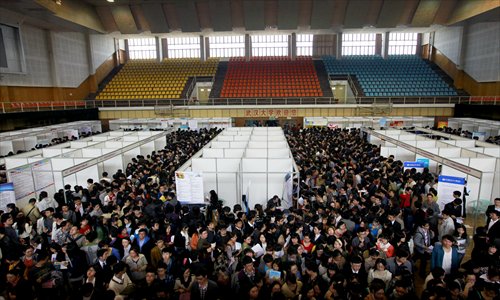Crowded rat race
Read more in daily special: New grads crowd tightening job market

Main: Liu Liu, 23, serves coffee at a coffee shop in Ningbo, Zhejiang Province on May 28. She receives a monthly salary of 3,000 yuan. Photo: CFP
These days, nothing gets Ma Hui more excited than when her phone rings. It could be a potential employer.
Ma Hui, who is graduating from a college in Shandong Province answers the call on the first ring, but ends up disappointed when it turns out to be her parents calling to ask if she has found a job yet.
About 7 million college students are expected to graduate this summer, almost equivalent to the entire population of Hong Kong. This marks a national record and an increase of 190,000 over last year.
Let's not forget that another 210,000 graduates from last year still haven't found a job, complicating matters further.
Earlier this month, President Xi Jinping paid a surprise visit to a job fair in Tianjin, a move experts said showed the leader's concerns for the job market.
"Employment is the basis of people's livelihoods, and is also an issue confronting the whole world," Xi was quoted by the Xinhua News Agency as saying. "Without economic growth, the employment issue can't be solved."
Experts believe the number of unemployed graduates has raised alarms about social stability.
"The employment of graduates is not just a matter of people's livelihoods and economic performance, but is also linked to social harmony and the country's stability," Luo Jianhui, deputy dean of the School of Journalism at Renmin University of China, told the Global Times. "It is a true test for the quality of higher education."
However, many believe the problem is not easy to fix amid the rapid expansion of college admissions and a seemingly contracting job market.
Job dissatisfaction
"It is not that graduates really can't find a job but many of them are waiting for their dream job," Li Dandan, 23, new graduate from Anhui University, told the Global Times.
After rounds of interviews, she found a job in a trade company in November last year but she still keeps trying to become a government official.
According to a recent report conducted by the Chinese Academy of Social Sciences, job satisfaction is low among new graduates. Only 1.6 percent of graduates said they felt satisfied with their jobs and about 60 percent of 2011 graduates said they had already changed jobs once or twice.
Government positions seem to be dream jobs for new graduates as many parents who are limited to only one child believe the job can lead to a steady and happy life. The number of students taking the national civil-service exam reached over 1 million in 2008. On average, there are 60 applicants per vacancy but some prize posts see more than 1,000 hopefuls.
Maybe the new generation is not as spoiled as many people think. To save money during their long-term job hunting, some 40 new graduates decided to share a 130-square-meter room equipped with only one bathroom in Beijing together, according to Beijing Youth Daily.
However, government officials and experts expressed worries that groups of unemployed graduates, also known as "ant tribes", could pose a threat to social stability.
"They were told education could change their lives, but now they can't find a job after college, they might feel angry at society," said Zhou Tianmin, National Committee of the Chinese People's Political Consultative Conference.
A survey found out the starting salary of 69 percent of 2012 graduates is about 2,000 yuan ($326.4) a month, which is less than the average salary of a farmer. The survey caused debate on whether or not high education is becoming increasingly irrelevant.
Tao Hongkai, a professor of education at Huazhong Normal University, told the Global Times that new graduates should face the music.
"Students think it is a great deal to go to college but they should lower their expectations," Tao said. "The job market will not get better in the years ahead, so get a job first, and pick your career later."
Many said the rapid expansion of university rolls is to blame. Aiming to give more people access to higher education, China started expanding university rolls in 1999. The number of graduates jumped from 1.08 million in 1998 to 6.99 million in 2013.
The college building boom also turned vocational schools into full-blown universities. This has obviously had a huge impact on the graduate job market.
"The massive expansion of university rolls has caused an imbalance between creating talents and social demand," said Xiong Binqi, vice president of 21st Century Education Research Institute.
Tao said up to 70 percent of university students are not "qualified" for the positions they apply for due to the massive expansion of places.
"Once they enter university, many feel free and don't study that much," he said. "After four years, many end up with low ability and low achievements."
"I was told by some recruiters that they are reluctant to hire new graduates," Tao added.

Connections help
In a survey titled "How to survive in the hardest job hunting year" conducted by the Beijing News, half of the 300 students interviewed said they were the source of their own problems while one third blamed the poor state of the economy.
"It is very important to change your mindset and be positive," said Yu Yubao, a new graduate from Chinese Academy of Sciences with a master's degree in computer science.
Yu said he was quite confident when he started his job hunt but fell apart after going to 12 unsuccessful job interviews in three months.
"The peer pressure is the source of my frustration," Yu told the Global Times. "Then I realized it is the attitude that matters."
But many believe connections, or guanxi, are what matters in finding a job. In the same survey, 21.5 percent of students said they used "connections" during their job hunts.
Another common complaint is the unfairness new graduates feel they experience during job interviews.
Yang Liushan, 22, who is majoring in English at Anhui, told the Global Times that there is discrimination against women.
"One HR team asked men and women to hand in their resumes separately, then we saw they only took away the men's resumes," Yang said.
Brain drain
To avoid the fierce competition in the brutal job market, many choose to study abroad or start a masters' degree in the hope that higher education might bring more opportunities.
The number of Chinese students studying overseas hit a record of 1.27 million in 2011 according to the Ministry of Education. But statistics show that only one third of these have returned home, leading to worries of a brain drain.
For those who cannot afford to study abroad, continuing in higher education at home often seems the best choice.
Yang said she started job hunting only after failing her postgraduate entrance exam in April. Among 20 students at her class, six chose to study abroad and three decided to take a master's degree.
At an executive meeting of the State Council, Premier Li Keqiang called for more employment options for college graduates.
In response, some private-run companies announced an increase in their recruitment of new graduates, a corporate social responsibility move to help relieve the tough employment situation.
Wang Jianlin, chairman of Wanda Group, said that the company is expected to recruit 7,000 new graduates this year, up 10 percent from 2012.
Xu Mei, spokeswoman of the Ministry of Education, assured new graduates that the government was hard at work to not let the employment rate fall this year.
In universities, career consultants encourage new graduates to start their own businesses or move to smaller cities to find jobs.
In Tsinghua University alone, one of the country's best universities, half of 2012 graduates found jobs outside of the capital, 20 percent up from 2003 graduates, according to Xiong Yizhi, a consultant with the university's career center.
However, Tao said that to really fix these problems, the quality of new graduates and high education should be increased.
"Educators should pay attention to students' quality, not quantity, otherwise we will face the same problem for summers to come."
Ni Wei contributed to the story